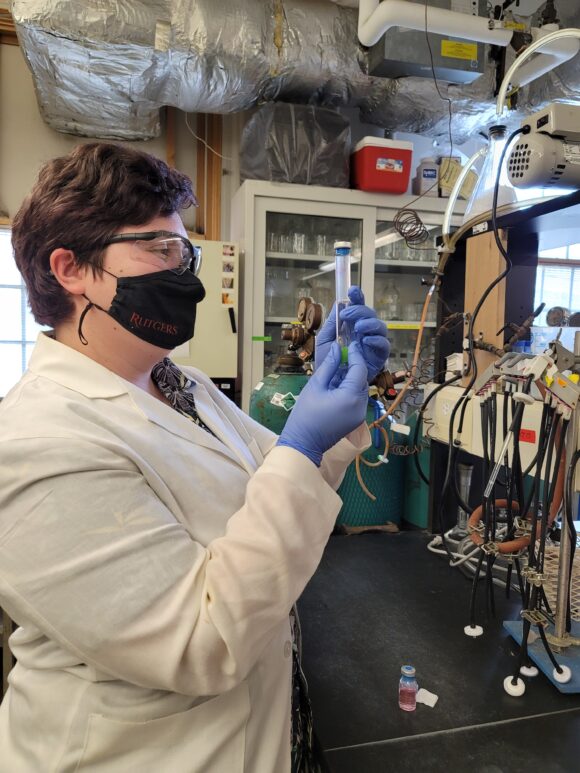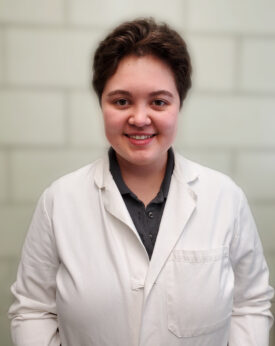
Max Dvinskikh working in the lab, checking a culture for growth after performing a serial dilution. Photo courtesy of Max Dvinskikh.
“Max Dvinskikh is an honors student and currently has the highest GPA of our graduating seniors,” says Ines Rauschenbach, assistant teaching professor in the Department of Biochemistry and Microbiology. “They have worked on multiple research projects and been extensively involved in many clubs and programs on campus. Max has also been invited to further their education at multiple high-ranking universities. They are a perfect role model and example for our major!”
The Office of Marketing and Communications recently spoke with this high-achieving senior.
Is there a significant or rewarding moment in your undergraduate journey at SEBS?
When I was a toddler, I developed a severe speech impediment that for the longest time prevented me from pursuing opportunities and friendships that I was interested in because I was ashamed of how I perceived myself. It took a lot of work with speech professionals, but recently I presented my work at a regional conference and received an award for the best undergraduate poster! I still have my speech impediment but it is no longer stopping me from pursuing my dreams. Working through it has helped me develop confidence and self-esteem and taught me to value my comfort and people that respect me for who I am.
We understand you are an honors student and currently have the highest GPA of the graduating seniors in Microbiology; what has motivated you to succeed?
I never actually thought about it, I genuinely enjoy learning, so it just sort of… accidentally happened. My professors are amazing at teaching, and I like talking to them and hearing their opinions about scientific discoveries.
We understand you’ve worked on multiple research projects. Is there one that stands out for you?
My current independent research project in the Häggblom lab on isolation of dehalogenating bacteria. Distinguished Professor Häggblom’s passion for environmental microbiology is truly contagious – I fell in love with my project and transferred to his lab last spring. I am finishing my GH Cook thesis in his lab now, which allowed me to work more independently on the topic and develop my own question to answer. It has been an amazing experience, I loved the independence and the control over the project that I had, while also having the support of Häggblom, professor Lee Kerkhof and my PhD lab mentors.
Is there particular club on campus that you would like to talk about?
I am the president of the Russian Club at Rutgers. It has allowed me to connect with my heritage and meet people who have a similar appreciation of the culture. The club provides a great opportunity to relax and make new friends, keeping in touch with our roots and remembering where we came from.
What is the most valuable lesson you learned here?
If you feel like you do not belong in a group, then make your own place—find the people that respect and support you, do the things that make you happy, and make time to stay in touch with yourself. It may seem scary and difficult at first, but if you focus on happiness, everything else falls into place much easier.
What is your major and what triggered your interest in it?
I am majoring in Microbiology. I came to Rutgers with this major as my proposed one and stayed after taking “Living in a Microbial World” with teaching instructor Ramaydalis Keddis. She sparked my interest in the endless possibilities within the field, and I never changed my major. I was initially planning on going to medical school after Rutgers, but working in labs with professors James White, Gerard Dismukes, and Max Häggblom made me realize how fascinated I was with microbiology research. I switched out of pre-med track and never looked back.
What do you find the most interesting about your major?
It has an endless list of topics to study because microbes are present almost everywhere, even in places where nothing else can survive. You can study them your whole life and barely scrape the surface of the field. Your own personality and thoughts are to a big extent controlled by your microbiota, so essentially I am a microbe-controlled machine studying microbes.
 Tell us what has motivated you?
Tell us what has motivated you?
My family is from a small town in Russia where most people didn’t have a bachelor’s degree. My father has put all of his energy and resources to give his children better opportunities, and I have access to all the life routes that I didn’t even think were possible when I was young. I am grateful to my family for supporting my academic interests and passion for science.
Ever since I joined my program and my department, I have felt supported and understood. I went through some rough semesters but I never doubted that I had people that believed in me and would help me find ways to make things work. They helped me get out of my comfort zone while offering alternatives when I had to find ways out of toxic situations. I cannot endorse my department enough, just as I cannot find the words to express my appreciation for the support I got from the administration of the Honors Program. My friends, my professors, and the SEBS Honors administration have been here for me with no questions asked, no doubt that I was doing my best at any point, and they were a huge source of my motivation.
What do you consider the most challenging thing about college or the major you are pursuing?
Knowing when to stop. There are so many opportunities out there, especially at Rutgers, I have to remind myself that I also have required classes, my research, and my job, and there are a limited number of hours in a day. Putting selfcare first is both very difficult and very important.
Were there any other challenges you overcame to get to where you are now?
I have battled depression and anxiety, and have had to learn to accept myself, work with what I’ve got, and give myself the respect I deserve. Accepting my identity, personality, and moral compass was hard because they go against what I have been taught since childhood. Learning to refuse the gender binary has been one of the hardest things in my life, but I found the joy in being myself despite the pushback.
What are your plans after graduation?
I have been invited into PhD programs in microbiology or biological sciences at Yale, Columbia, Dartmouth, and University of Washington. While all of these schools are fantastic, I have decided that I will be attending Yale, in the fall, and working on microbiome-host interactions. My goal is to continue working in a lab and doing research.

